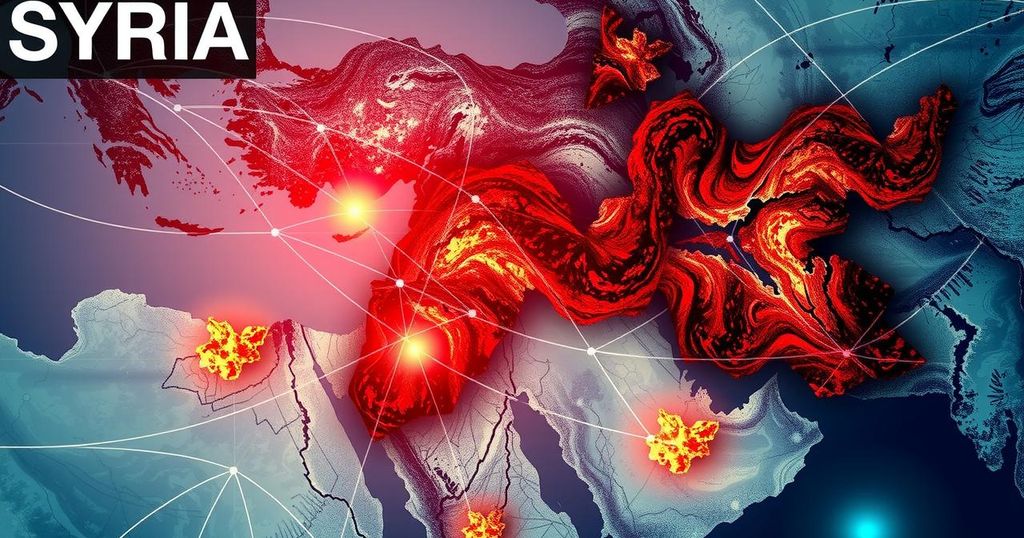Turkey and Qatar are emerging as key influencers in Syria following the decline of Iranian power. Their roles as brokers and mediators are reshaping the geopolitical landscape, with both nations seeking to support democratic movements while pursuing their national interests. This shift represents a potential realignment in Middle Eastern politics, as they work collaboratively to establish a stable post-Assad regime.
In the rapidly changing geopolitical landscape of the Middle East, Turkey and Qatar have emerged as pivotal players in Syria following the decline of Iranian influence. Their involvement as brokers and kingmakers presents opportunities to reshape the region’s dynamics, particularly in support of democratic movements and Islamist political entities. Historically, both nations have backed factions considered to be on the losing side during the Syrian civil war, and with the weakening of the Assad regime, they are now positioned to assert greater influence in Syria.
Turkey’s strategic objectives include diminishing Kurdish forces, viewed by Ankara as threats, and ensuring stability through a reinforced military presence in the region. Qatar, recovering from regional isolation, is now establishing itself as a crucial mediator in Syria while simultaneously playing a role in broader ceasefire negotiations. Analysts note that Turkey’s President Erdoğan stands as a geopolitical victor due to steadfast support for the Syrian opposition, while Qatar’s renewed engagement enhances its global reputation as a stabilizing force.
The realignment of power in the Middle East also hinges on the economic interests of both Turkey and Qatar, who are likely to initiate large-scale reconstruction efforts in Syria. This approach is intended to promote national stability and economic recovery while avoiding the complexities international involvement can sometimes bring. With their combined efforts, the two nations aim to prevent proxy conflicts and instead foster a stable democratic trajectory for Syria, aspiring to make it a regional model for governance.
In their cooperative stance, Turkey and Qatar seek to include various regional actors in discussions concerning post-Assad Syria, addressing potential concerns regarding their rising influence. High-level dialogues indicate a willingness to engage with nations such as Saudi Arabia and Egypt, alleviating fears of domination through inclusive policymaking practices. Their commitment to cooperation over competition presents a critical shift away from previous strategies employed by regional powers, including Iran.
In summary, Turkey and Qatar’s recent roles in Syria symbolize a significant shift in Middle Eastern geopolitics, reflecting a broader trend towards regional cooperation that emphasizes stability and shared governance. As they navigate the intricacies of this evolving landscape, their collaborative approach could provide a foundation for future peace and prosperity within Syria and the wider region.
The geopolitical landscape of the Middle East is currently in flux, marked by significant changes in power dynamics, particularly in Syria. The previously dominant influence of Iran is waning, leading to new opportunities for other nations, primarily Turkey and Qatar, to assert their interests. For years, these countries have supported opposition forces against the Assad regime, and as the balance shifts, they now find themselves in positions of increased influence within Syria. Their strategies include both military and diplomatic efforts aimed at ensuring a stable and friendly government in post-Assad Syria while pursuing their national and regional objectives.
The evolving situation in Syria marks a critical juncture in Middle Eastern politics as Turkey and Qatar redefine their roles in the aftermath of Iran’s diminished influence. By strategically positioning themselves as mediators and supporters of democratic movements, both nations seek to create a stable environment conducive to reconstruction and governance reform. Their collaborative approach, which includes outreach to other regional powers, sets a precedent for a more inclusive and cooperative geopolitical landscape, emphasizing consensus over dominance in pursuing lasting peace in the region.
Original Source: www.csmonitor.com







